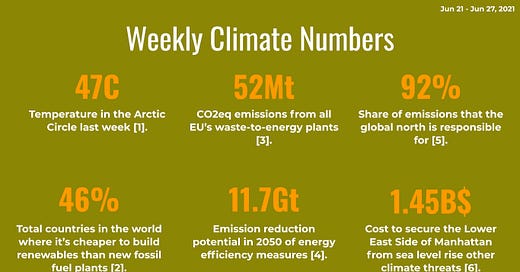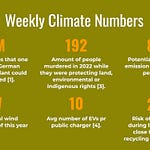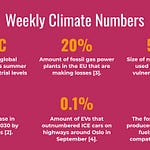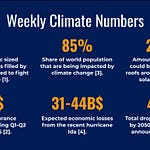Welcome to this week’s edition of The Weekly Climate 🎉
References: [1], [2], [3], [4], [5] and [6].
A bit of housekeeping:
Last week’s live interview was unfortunately, cancelled, so I’m doing an e-mail based interview with the interviewees about offsets. I still expect the deep dive on offsets will still land in your inbox mid this week.
Also changing the format for announcing deep dive interviews a bit. Instead of announcing it in the weekly newsletter I will announce it a little later in the week when the speaker is known. I hope this will make it less confusing about what to expect from the interview.
Finally, this weeks deep dive will be the last I will do on a weekly basis. Instead I will switch to doing them 1-2 times pr month. This is to make sure I have time to get the right speakers and topics on.
‼️News you can’t miss
Here’s one important scary/bad (🙀), good (😻), interesting (😼) and fossil (💩) news item.
🙀 Leaked IPCC report reveals that climate scientists are becoming increasingly concerned about when we will reach climate tipping points.
😻 62% of renewable installations that came online last year was cheaper than the cheapest fossil fuel option.
😼 A deep dive into the environmentally damaging waste-to-energy sector
💩 Massive methane leaks revealed at 120+ fossil gas installations around Europe.
👩⚕️ Status: Climate & Science
Let’s look at how we’re doing this week!
[#arctic] — Soo.. ground temperatures hit 47 degrees C in the Arctic Circle last week. That number was reached in Siberia, but the entire area is seeing scorching heat these days.
[#tippingpoints] — IPCC has long been criticized for adapting their reports to what political heads wants to be in them, so it’s probably good news (that comes with bad news) that a report was leaked. In the draft report leaked to a french news agency climate scientists are increasingly concerned that we’re getting closer and closer to climate tipping points. This is also good news as earlier IPCC reports have failed to include tipping points in their reports.
[#wildfire] — At least 15 wildfires are raging in the Arizona currently covering an area as big as 160.000 hectares. Here’s a satellite look at some of the wildfires currently raging in the West.
[#heatwave] — You have probably already seen reports of the record-breaking heat wave that is hitting the US west coast these days. It packs a pretty bad one-two punch as the area is also in the middle of the worst drought in many years.
📰 The 7 Grand Challenges
⚡️Decarbonize Electricity
Clean electricity is the one do-or-die challenge we must solve.
[#renewables] — Renewables are cheaper than building new fossil fuel power plants in countries that cover 46% of the global population according to a new analysis by BloombergNEF. In fact 62% (or ~160GW) of new renewable installations that came online in 2020 was cheaper than the cheapest new fossil fuel option. This is great news. In fact through 2020 the cost of solar felt by 16%, onshore wind by 13%, offshore wind by 9% and utility scale solar by 7%. Since 2010 utility scale solar costs have dropped by 85% and for offshore wind it’s 56%.
[#renewables] — And more good news on the renewables front: According to new numbers from the US released last week, renewables overtook coal generation in 2020 just barely. Both clocking in at around 800GWh (although that does include biomass).
🏘 Reduce impact of urban and rural areas
Lowering the impact of urban and rural areas.
[#waste2energy] — Here’s a look at the waste-to-energy sector. Waste-to-energy is highly polluting, not just in CO2 emissions, but also in other toxins that are released into the air from incinerating garbage. The problem is especially bad in EU where about 1/3 of all waste are burned releasing a total of 52Mt of CO2 in 2019 (more than Portugal). Carbon intensity of the process may be as high as 550g CO2e / KWh, which is more than 2x the EU average.
[#energyefficiency] — Here’s a great post on the all too overlooked climate solution that is energy efficiency improvements of buildings. It details how energy efficiency optimizations can save people and business money while at the same time cut carbon emissions. By 2050 it is expected that we can achieve 11.7Gt of carbon emission reductions from energy efficiency optimizations.
[#vw] — VW just announced that they will end sales of internal combustion engine (ICE) cars in Europe (only) by 2035 and China and US later.
[#amazon] — Here’s a pretty bad case for Amazon. According to an itv report published last week, Amazon caught destroying millions of products every year at a UK warehouse. This must have consequences.
🛁 Clean non-electrifiable activities
Some activities we do today can’t be electrified, these must be cleaned some other way.
[#sails] — With all the talk of the shipping industry’s poor performance when it comes to reducing it’s carbon footprint here’s an interesting look at an old technology that might help: Wind. It dives into how modern sails work (surprisingly similar to how it work 100s of years ago) and how they can be adapted to fit a modern economy with expectation of stable shipping times.
[#steel] — The Swedish fossil-free steel project HYBRIT just reached a major milestone which is producing a key step of the steel production process (sponge iron) using their fossil-free process on a pilot scale, which is a step up from laboratory scale.
[#cement] — Here’s a deep dive into the cement industry. Written by Energy Impact Partners, Madison Freeman, she goes into the pathways that the cement industry has to reduce emissions and looks at interesting technologies in the area. Highly recommended read for anyone curious about cement. This is becoming increasingly relevant as a group of investors representing 2T$ last week started putting pressure on concrete producers to decarbonize.
[#aviation] — A new short documentary looks at the aviation industry’s attempt to go electric and is quite blunt about the fact that electric airplanes are coming and here to stay. This article looks at the key points of the documentary and the aviation industry’s general attempts and pathways to decarbonize.
🌳 Protect and grow nature
Nature is our ally, we must protect it and help it help us.
[#hemp] — Here’s a look at all the different applications of hemp and how it could likely be used in a wide variety of solutions: From fuels to building materials. Unfortunately, it looks like hemp-based solutions are still a bit controversial and was excluded as a topic from COP26 despite more than 4000 delegates registering their interest.
[#peat] — A look at an attempt to save Welsh peatlands and to no surprise there’s an animal solution to this. Typically the peatlands around that area have had roaming sheep run by sheep farmers, but the sheep are so many that they’re accelerating the erosion of the peat. Instead cattle should be brought in which will likely cause the farmers to have fewer animals on the pastures.
[#water] — Here we look at how wildfires are affecting water supplies. A wildfire can in many cases cause soil erosion and that erosion can lead to contaminated water supplies, which can remains so for decades.
[#amazon] — A key killer of the Amazon may have been removed from office as Brazil’s environment minister has quit, after he was accused of helping illegal logging of the rainforest. Still the kingpin Bolsonaro remains though..
🍽 Optimize food
Without the lower impact of food or drink the hero doesn’t work (modified old danish proverb).
[#airfood] — You’ve heard about vertical farming I’m sure, where giant warehouses or people’s own homes are being converted into an urban high-efficiency garden. Hereby in some cases eliminating the need for land (due to efficiency increases) and transportation. Here’s an even crazier idea, why not take the same solar used to power these (ahem that should be used to power these) and CO2 from the air and use that to make chemicals with which to grow microbes that can be used to replace things like environmentally damaging soya beans? That’s what a group of researchers are working on. It’s called food from air and it sounds totally magical. But the conclusion is that the same area of land can be used to grow 10x more food using this technology.
⚖️ Climate Justice
Without justice there’s no future.
[#indigenous] — A new UN report highlights that land grabs of indigenous land is not only a problem for the the tribes themselves, but for the planet’s biosphere as these incursions increasingly destroys biodiversity.
[#greenwall] — A project called the Great Green Wall is a reforestation project that aims to help those countries in Africa who are at the frontline of the climate crisis. The project will restore 100 million hectares, help pull down 250Mt CO2 and create 10 million new jobs across the African continent.
[#congo] — Here’s a rare glimpse at what the climate crisis is doing to Congo and especially the congolese people. Not only is deforestation rampant which is a by-product of poverty and violence and which is driving erosion, which in turn is fueling flooding which leaves many people homeless with close to no opportunities. This is really horrible.
⬇️ Engineered drawdown and geoengineering
Protecting our planet and species one way or another
[#carbonremoval] — MIT Tech Review dives into carbon removal via direct air capture and looks at the very technological pathways and talks with the players. The industry has its work cut out for it: The industry will need to grow by ~300x to get to the hoped 100$ pr ton CO2 removed.
[#geoengineering] — A great discussion piece on Bloomberg, not unlike my own deep dive on net-zero, argues that there are two extremes that are too often portrayed: Either you’re a techno-optimist or you think behavioral change is the only way to go. And surprise surprise: We need both. And we should be rational about developing both because at this point it seems likely that everything will be needed.
[#ccus] — A very interesting deep dive into the utilization options for CO2 in which companies inject CO2 into various products. It takes the vantage point of the company Interface that makes carpets. They analyzed their carbon footprint and realized various ways not only to reduce their emissions but also incorporate CO2 in various forms into their products.
📦 Other / catch-all
All the other stuff that I couldn’t fit into any of the other categories, than the other category.
[#investing] — Such a needed discussion here and what I have been flagging since I first got involved in climate. When there’s money the people trying to capitalize on that will come just like what happened to AI a few years back. The problem this time around is that it’s greenwashing and is countering all other chances we have at solving this problem. More investor education is for sure needed and investors needs to take the responsibility of doing proper climate due diligence on their investments.
[#ecocide] — I’ve been talking about ecocide before and now finally a team of 12 lawyers have released a 160page definition of ecocide which is hoped to be included in the International Criminal Court. That process though, could take years…
[#showyourstripes] — If you’ve been on SoMe the past week you’ve probably seen people posting their stripes. This was a part of a campaign called #showyourstripes which aimed to get people to share their region’s warming stripes which in a simple way illustrate how the global temperature in each country has changed over the years. The University of Reading which launched the campaign are very happy with the results citing that it has started climate conversations all around the world.
[#systemicchange] — I had this article in my cross-hairs last week but thought it had a too rosy-eyed look at US emissions (and it does), but it’s points are interesting as was highlighted by a tweet thread by Dr Jonathan Foley of Project Drawdown. So here it is. The article basically argues for an interesting global phenomenon that seems to help drive down emissions (although it looks like the article per usual is ignored imported emissions) by incremental improvements across all of humanity’s activities from business to politics to individual behavior change. It argues (and I think Dr Foley does it particularly well) that “systemic change” doesn’t come from “a place”, no it comes from many many places.
⭐️Special Topics
🎩 Global and local policy
We have a special interest in covering the major global and local policies regarding climate, whether good or bad.
[#responsibility] — A new study calculates that the global north is responsible for 92% of all excess carbon emissions and thus argues that the global north should of course bear the major parts of the costs incurred by this “atmospheric colonization”.
[#eu] — A new EU law is being passed, which is the first ever to regulate how the shipping industry must switch to sustainable fuels. The problem: It’s allowing fossil gas and biofuels of the kind that are worse for the climate than fossil fuel counterparts. Detailed analysis by Transport & Environment.
[#g7] — The great Michael Mann walks through the climate wins and the loses at this years G7. Yes there was no firm date settled for coal phase out, but they did agree on phasing out funding for coal projects. It has also recently been revealed that China has decided to halve of it’s planned coal projects citing cost and risk as reasons.
[#netzero] — Last week’s deep dive article dived into net-zero and this one seems so well-timed as to be almost coordinated. It’s Climate Action Tracker who are tracking policies globally and how inline they are with the Paris agreement. They will start doing their own analysis of the commitments that countries submit to the UN (NDCs) and will among other things split their net-zero targets into emission reductions and carbon removal. Nice! Can’t wait for this report to come out.
[#biden] — Activists are worried that Biden’s climate pledges are falling apart. In the first weeks after he took office he was hailed as the climate saviour. But now it looks like many of the his pledges are running into trouble. The article cites a lot of Biden’s recent climate losses: From trouble with pausing all oil and gas drilling leases to giving the go ahead to new fossil fuel projects. Recently Biden has ok’ed a highly protested pipeline called Line 3 which will transport dirty Canadian oil sands oil through Minnesota.
[#policy] — Ezra Klein sat down with a group of respected climate veterans to discuss the key question of whether politicians will ever be able to help solve the climate crisis in any meaningful way. The answer is complicated and you will have to read the article to get to any meaningful conclusion yourself.
[#worldbank] — The World Bank just announced that it will commit to doing annual reports on its climate action plan and increase the amount of money it will spend on climate from 28% to 35%. It don’t commit to stop funding fossil gas projects for instance but does say that they will need to face high some high thresholds to win funding. So both good and bad I guess.
🛡 Adaptation
Adapting our civilization to the coming climate crisis is vital. Here we cover various ways that is happening (or isn’t).
It’s clear that adaptations to protect civilization from the coming climate crisis is already happening around the world and I felt it was important to give these their own section so here goes.
[#newyork] — New York City has launched a 1.45B$ project to project the lower East Side from sea level rise and extreme weather. The project will feature berms, sea walls and flood gates.
[#farmers] — Small scale farmers especially in the global south are usually improving their farms over their entire lifetime in response to changes in the climate. However, according to a new report by the World Resources Institute climate change recently are happening so fast that it leaves them no time to adapt and thus threatens not only their livelihood but their lives.
⛽️ Major Carbon Emitters
We have a special interest in covering the moving of the major carbon emitters as these are the key roadblock to climate action.
[#investing] — Engine no 1 is launching an index fund (a so called ETF) which will track the performance of the top 500 biggest companies in the US. All shares held by the ETF will be utilized by Engine no 1 to affect board member decisions and shareholder votes as we recently saw they had a lot of success with.
[#investing] — The Federal Reserve Bank of Dallas has released it’s energy survey, where they ask execs in the energy industry about their outlook on the future. And many fossil execs cites big concerns regarding raising enough money all citing green energy transition as the main culprit. It’s working.
[#petrostates] — The UAE sets 2050 net-zero goal. This raises an interesting question: Can a petro-state have a net-zero goal without them dismantling their fossil fuel industry (of which they have no plans AFAIK)? Net-zero goals doesn’t include a country’s exported emissions hence this would allow UAE to go net-zero without doing that. Akshat Rathi has a very interesting twitter thread about this which stand in somewhat contrast to my recent deep dive on net-zero.
[#greenwashing] — As expected the Science Museum in the UKs exhibition on climate change sponsored by Shell and featuring and awkward amount about carbon capture and storage was the target of an activist operation in which young activists employed civil disobedience and tried to stay in the museum.
That’s it for this week folks!
Remember if you’re feeling down, angry or sad from some of the news in this newsletter one cure is to act. And one way you can always act that also happens to be one of the most powerful things you can do is to talk about it. That also works if what you just read made you hopeful or happy btw.
If you enjoyed this newsletter don’t forget to share it with your friends, coworkers or other people you think could benefit from getting it. If you got directed here by a friend or another link on the Internet don’t forget to subscribe!
See you all next week 👋















Share this post